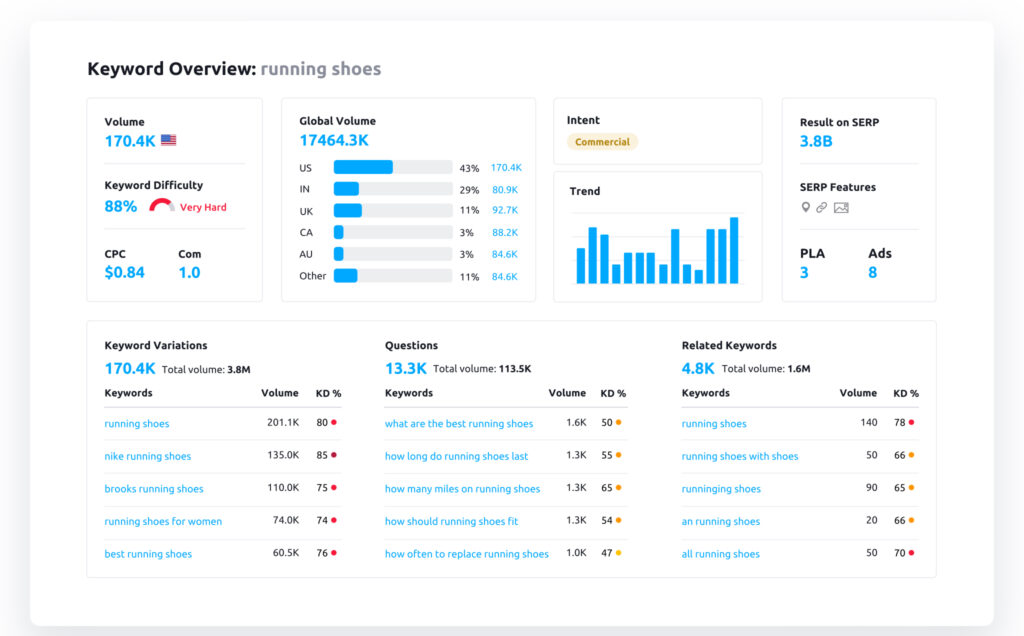Mastering how to do keyword research with Semrush is a game-changer for anyone looking to boost their online visibility and outsmart their competition.
With everyone trying to rank higher on Google’s search results, it’s essential to understand the basics of SEO and keyword optimization. This knowledge is valuable not just for marketers but also for anyone looking to improve their online visibility.
Whether you’re a blogger, a small business owner, or a digital marketer, Semrush can help you boost your online visibility and outsmart your competitors.
In this guide, we’ll show you how to use Semrush to find the right keywords for your website and how this tool can help you grow your digital presence.
- Why Keyword Research with Semrush Matters in SEO
- Getting Started with Semrush: A Step-by-Step Guide
- How to Conduct Keyword Research Using Semrush
- Advanced Techniques for How to Do Keyword Research with Semrush
- Leveraging Semrush Domain Analytics for Competitive Edge
- Integrating Semrush Data with Your SEO Strategy
- Simplify SEO with Semrush and Flying V Group
- FAQs
- 1. How often should I do keyword research with Semrush?
- 2. Can Semrush help me find keywords for a local SEO strategy?
- 3. What’s the difference between short-tail and long-tail keywords in Semrush?
- 4. How can I improve my website’s domain authority with Semrush?
- 5. Does Semrush offer suggestions for content based on keyword research?
Why Keyword Research with Semrush Matters in SEO
Understanding how to do keyword research with Semrush is crucial for anyone aiming to enhance their website’s visibility and effectiveness.
Why?
Because keyword research is the foundation upon which successful SEO strategies are built. It involves delving into your potential customers’ language when they turn to search engines for their queries, needs, or problems.
This process is not just about identifying popular terms; it’s about uncovering the specific words and phrases that connect your website’s content to your target audience’s search intent.
A tool like Semrush can help you find the right keywords for your website. Integrating these keywords into your content can improve your chances of appearing higher up in search results. This can lead to more traffic to your site and more conversions.
If you’re a business owner, blogger, or digital marketer, learning how to do keyword research with Semrush can be a valuable skill to have.
By understanding how people search for information online, you can create content that connects with your audience and helps your website stand out.
Getting Started with Semrush: A Step-by-Step Guide

To embark on your keyword research journey with Semrush, you must first familiarize yourself with its interface and features. Here’s a step-by-step guide to getting started:
Creating a Semrush Account:
Visit Semrush’s website and sign up for an account. You can choose from various subscription plans based on your needs and budget.
Navigating the Semrush Dashboard:
Once logged in, you’ll be greeted by the dashboard. Here, you can access many tools and reports that Semrush offers, including keyword analytics, domain analytics, and more.
Introduction to Semrush Domain Analytics:
Before diving into keyword research, explore the Domain Analytics section. It provides valuable insights into your website’s or competitors’ online presence, helping you gauge the competitive landscape.
How to Conduct Keyword Research Using Semrush

Semrush’s Keyword Magic Tool is your gateway to uncovering valuable keywords. Follow these steps to use it effectively:
Accessing the Keyword Magic Tool:
In the Semrush dashboard, locate and click on the Keyword Magic Tool under the ‘Keyword Analytics’ section.
Understanding Keyword Metrics:
Enter a seed keyword related to your niche. The tool will generate a list of related keywords and critical metrics like search volume, trend, keyword difficulty, and CPC (Cost Per Click). These metrics are essential for evaluating the potential of each keyword.
Identifying Long-Tail Keywords:
Focus on long-tail keywords, which are longer and more specific phrases. They often have lower competition and can attract more qualified traffic to your site.
Advanced Techniques for How to Do Keyword Research with Semrush
Once you’re comfortable with the basics of Semrush’s Keyword Magic Tool, it’s time to explore more advanced techniques to refine your keyword research:
Using the Keyword Difficulty Tool:
This feature assesses how challenging it would be to rank for a particular keyword. A lower score indicates easier ranking potential, making this tool invaluable for prioritizing your SEO efforts.
Analyzing Competitor Keywords with Semrush:
Enter your competitor’s domain into the Semrush search bar to uncover the keywords they’re ranking for. This insight lets you identify gaps in your keyword strategy and opportunities to outperform them in SERPs.
Incorporating Keyword Variations and Synonyms:
To capture a wider audience, include variations and synonyms of your target keywords. Semrush’s Keyword Magic Tool suggests these alternatives, enhancing your content’s relevance and reach.
Leveraging Semrush Domain Analytics for Competitive Edge
Domain Analytics is a powerful Semrush feature that provides a wealth of data on any domain’s online performance. Here’s how to use it to your advantage:
Overview of Semrush Domain Analytics Features:
Access detailed analytics on search traffic, keyword positions, backlink profiles, and competitive positioning. This view helps you understand your website’s strengths and weaknesses.
Benchmarking Your Site Against Competitors:
Use the Competitive Positioning Map to see how your site stacks up against competitors regarding search visibility and keyword portfolio. You can guide your SEO strategy by identifying areas where competitors are outperforming.
Identifying Opportunities for SEO Improvement:
The Domain Analytics section also highlights potential areas for improvement, such as under-optimized content or missing keywords that could drive additional traffic.
Integrating Semrush Data with Your SEO Strategy
With a wealth of data at your fingertips, the next step is to integrate these insights into a coherent SEO strategy:
Prioritizing Keywords for Content Creation:
Based on keyword difficulty, search volume, and relevance, prioritize keywords that offer the best opportunities for your site. Focus your content creation efforts around these keywords to maximize SEO benefits.
Optimizing On-Page Elements with Targeted Keywords:
Incorporate your selected keywords into critical on-page elements such as titles, meta descriptions, headers, and throughout the content body. This not only helps with rankings but also improves user engagement.
Tracking Your SEO Progress and Adjusting Strategies:
Semrush’s Position Tracking tool allows you to monitor your website’s rankings for targeted keywords over time. Regularly review this data to adjust your SEO strategies, ensuring you remain on the path to achieving your goals.
Mastering keyword research with Semrush and integrating these insights into your SEO strategy can significantly enhance your website’s search engine visibility and performance.
Remember, SEO is an ongoing process, and success requires continuous learning, adaptation, and optimization.
Simplify SEO with Semrush and Flying V Group
Semrush is your go-to for more than just keywords; it’s a full view of how to outdo competitors and boost your site’s performance. For any business, SEO pro, or content creator, it’s the tool that simplifies driving traffic to your website.
Need to see real results? Flying V Group is here to amplify your Semrush experience with custom guides, expert-led sessions, and personal support tailored to your goals.
Don’t let SEO complexity hold you back. Reach out to us for straightforward, effective strategies to increase your online presence. Together, Semrush and Flying V Group are your partners in navigating the digital landscape effortlessly.
FAQs
1. How often should I do keyword research with Semrush?
Keyword trends can change due to various factors, including seasonality and shifting user interests. It’s advisable to conduct keyword research at least quarterly to ensure your content remains relevant and competitive.
2. Can Semrush help me find keywords for a local SEO strategy?
Absolutely. Semrush’s Keyword Magic Tool includes features for local keyword research, allowing you to target specific geographic areas and optimize for local search queries effectively.
3. What’s the difference between short-tail and long-tail keywords in Semrush?
Short-tail keywords are broad and often highly competitive, while long-tail keywords are more specific, longer phrases with lower competition. Semrush can help identify both, allowing you to balance your strategy between high-volume and niche targeting.
4. How can I improve my website’s domain authority with Semrush?
Semrush provides tools for backlink analysis and domain analytics, which can guide your efforts to build quality backlinks and improve your site’s authority and rankings.
5. Does Semrush offer suggestions for content based on keyword research?
Yes, Semrush’s Content Template tool uses your selected keywords to generate content recommendations, including potential backlink sources, readability scores, and critical topics to cover for improved SEO performance.






0 Comments